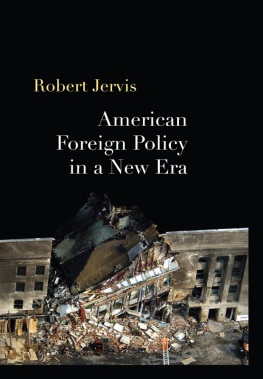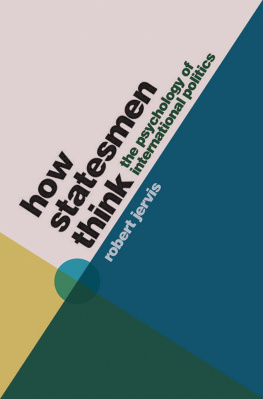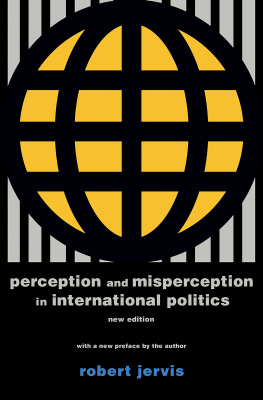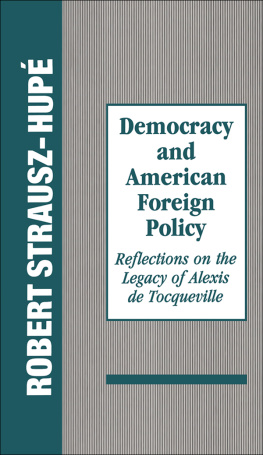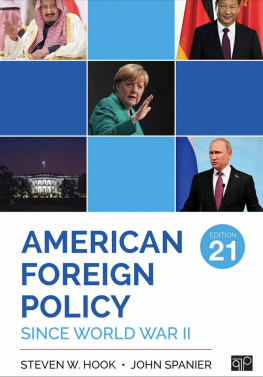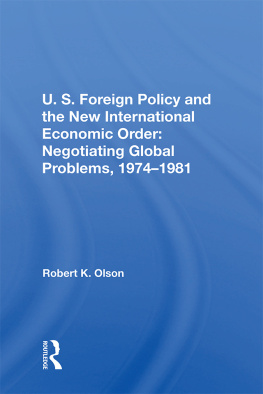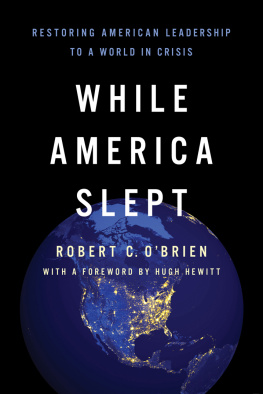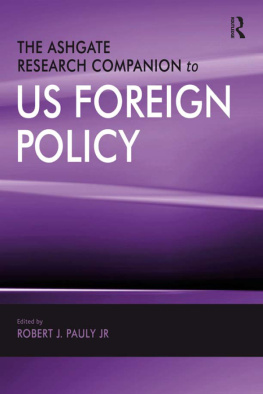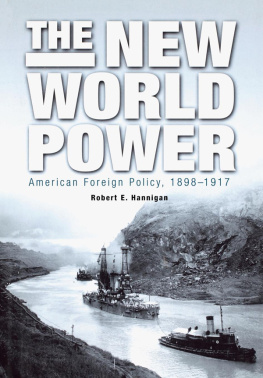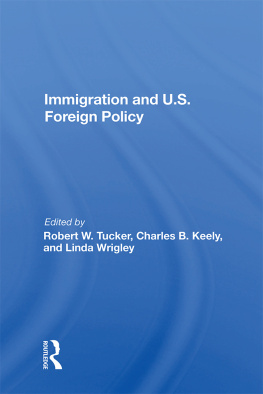American
Foreign Policy
in a New Era
American
Foreign Policy
in a New Era
Robert Jervis
Published in 2005 by
Routledge
Taylor & Francis Group
270 Madison Avenue
New York, NY 10016
www.routledge-ny.com
Published in Great Britain by
Routledge
Taylor & Francis Group
2 Park Square
Milton Park, Abingdon
Oxon OX14 4RN
www.routledge.co.uk
Copyright 2005 by Taylor & Francis Books, Inc.
Routledge is an imprint of the Taylor & Francis Group.
Printed in the United States of America on acid-free paper.
All rights reserved. No part of this book may be reprinted or reproduced or utilized in any form or by any electronic, mechanical, or other means, now known or hereafter invented, including photocopying and recording, or in any information storage or retrieval system, without permission in writing from the publishers.
10 9 8 7 6 5 4 3 2
Library of Congress Cataloging-in-Publication Data
Jervis, Robert, 1940
American foreign policy in a new era / Robert Jervis.
p. cm.
Includes bibliographical references and index.
ISBN 0-415-95100-3 (hardback : alk. paper) - ISBN 0-415-95101-1 (pbk. : alk. paper)
1. United States-Foreign relations-2001- 2. Bush, George W. (George Walker), 1946-Political and social views. 3. War on Terrorism, 2001- 4. Deterrence (Strategy) 5. Warfare. 6. World politics-21st century. 7. International relations. 8. Security, International. 9. Balance of power. I. Title.
E902.J47 2005
327.73-dc22
2004028638
Permissions
"Theories of war in an Era of Leading-Power Peace" originally appeared in American Political Science Review 96, no. 1 (March 2002): 1-14. Reprinted with the permission of Cambridge University Press.
A version of "September 11: How Has It Changed the World?" originally appeared in Political Science Quarterly 117, no. I (Spring 2002): 37-54. Reprinted by permission from Political Science Quarterly.
"The Confrontation between Iraq and the United States: Implications for the Theory and Practice of Deterrence" originally appeared in European Journal of International Relations 9, no. 2 (2003): 315-338. Reprinted by permission of Sage Publications Ltd. ( Sage Publications and ECPR [European Consortium for Political Research], 2003)
A version of "Understanding the Bush Doctrine" originally appeared in Political Science Quarterly 118, no. 3 (Fall 2003): 365-388. Reprinted by permission from Political Science Quarterly.
Dedication
To the memory of my parents, Dorothy and Herman Jervis, who tolerated and even encouraged my fascination with politics.
ACKNOWLEDGMENTS
I am grateful for comments by Robert Art, Richard Betts, Demetrious James Caraley, Dale Copeland, Gregory Gause, Peter Gourevitch, Chaim Kaufmann, Deborah Larson, Robert Lieber, John Mueller, Barry Posen, Robert Schulzinger, Marc Trachtenberg, Kenneth Waltz, and Dessie Zagorcheva. As usual, the work-study staff of the Saltzman Institute of War and Peace Studies and its tireless administrator, Ingrid Gerstmann, provided quick assistance in tracking down all sorts of odd sources, and in a most congenial manner the members of the Institute and the faculty and students at Columbia gave me great intellectual stimulation and more challenges than I could meet.
INTRODUCTION
The first chapter of this book was sent to the publisher the morning that the planes struck the World Trade Center. I do not have to tell anyone how rapidly the world has changed in recent years, and while professors are supposed to concentrate on general theories and long run trends, the temptation to try to understand our new world is hard to resist. Yielding to it, I hope, has value for both scholarship and the interested public. Our general theories about international politics informor should informour views about unfolding events, just as the latter probe, if not break, the former. Good social science theories are powerful tools to help make sense of the twists and turns of events that are themselves unpredictable.
Current world politics challenges many of our theories because it is new in fundamental ways. As I will discuss in , the leading powers in the world no longer fear armed conflict with one another, a development we take for granted but that in fact is an enormous, indeed revolutionary, change from the past. A related change, which may be one of the main causes for peace among the leading powers, is unipolarity or American hegemony. With the disintegration of the Soviet Union and the failure of Europe to unite, no state is in a position to challenge the United States in terms of material power, widespread influence, ability to set the framework for debate, and the capability although in many areas not a willingnessto provide public goods.
Whether or not this is beneficial to the United States or the rest of the world, the most important thing is that American power exists and is fantastically great, to paraphrase Bernard Brodie's famous statement about nuclear weapons. I will argue, however, that while this degree of dominance is unprecedented in modern history, American behavior tracks in important ways with what very powerful states have done in the past, and that it is likely to prove self-defeating.
A third change, the rise of terrorism and the American response to it, may not prove to be as basic or lasting, but it now rivets our attention. To an extent that is impossible to determine with any precision, these phenomena are related to the first two changes. Whether the United States would have been the target of the attacks of September 11 if it were not so powerful is an open question, but the American response is clearly conditioned by the nation's great capabilities and the lack of challenges from peers. The attacks move us into new terrain where normal state-to-state relations offer relatively few guidelines. But even if established theories of international politics and foreign policy say little about the causes and consequences of terrorism, they tell us much more about how states are likely to respond, why the Bush administration has adopted the foreign policy that it has, whether there were viable alternatives for dealing with Iraq, and whether current policies can be sustained.
The chapters in this book discuss these topics and present snapshots of world politics over the past few years, taking up important questions as they became salient since 2001. I have made only minor changes in them to avoid awkwardness and to bring matters up to date. The collection as a whole makes no claim to be comprehensive. Most obviously, I focus on security issues. Globalization, the state of the world economy, and American foreign economic policy are also crucial, as are evolving conceptions and practices of sovereignty and human rights. Overhanging all of this is the possibility that human activities will fundamentally change our environment, most clearly by producing global climate change. These questions are beyond my expertise, but the fact that I do not discuss them does not mean that I think they are unimportant.
ANALYSIS AND PRESCRIPTION
This book explicates and explains more than evaluates and prescribes. Of course these tasks intertwine both logically and psychologically, but there is no incompatibility between trying to understand a policy and condemning it. Scholarship should start, if not end, with understanding, however, and a strong dose of humility, useful in trying to construct explanations, is even more appropriate for prescriptions. But I should acknowledge at the start that I am deeply critical of most aspects of Bush's foreign policy. I believe that the overthrow of the Saddam regime and the broader Bush Doctrine have diminished American security, not increased it.


